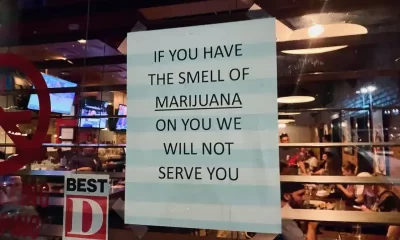Business
Half of Dentists Say Patients Arrive to Checkups Stoned, Survey Finds

Most would agree that a visit to the dentist is a less than ideal outing. And what do cannabis consumers often turn to before tackling something less than ideal? Grab the stash, light up, get a little toasty and press on, of course.
Evidently, so many cannabis users have embraced this strategy before their dental appointments that the American Dental Association (ADA) is speaking out, suggesting patients refrain from cannabis use before their visits. Additionally, a recent survey found that more than half of dentists (52%) reported patients arriving to appointments high on cannabis or another drug.
The findings were uncovered in two surveys: One surveyed 557 dentists; the second was a nationally representative survey of 1,006 consumers. Each survey was conducted as part of trend research by the ADA, which suggests the trend is due to increasing recreational and medicinal cannabis use across the nation.
As dentists talk through patients’ health histories, Dr. Tricia Quartey, a New York dentist and ADA spokesperson, said that more have disclosed their use of cannabis since it became legal.
“Unfortunately, sometimes having marijuana in your system results in needing an additional visit,” Dr. Quartey said in an ADA media release. According to researchers, showing up for a dental appointment while high can limit the care dentists are able to deliver.
The survey of dentists found that 56% had to limit treatment to high patients. Another 46% of surveyed dentists said they sometimes had to increase anesthesia to patients who needed care, due to the way cannabis and anesthesia impact the central nervous system.
“Marijuana can lead to increased anxiety, paranoia and hyperactivity, which could make the visit more stressful. It can also increase heart rate and has unwanted respiratory side effects, which increases the risk of using local anesthetics for pain control,” Dr. Quartey said. “Plus, the best treatment options are always ones a dentist and patient decide on together. A clear head is essential for that.”
The ADA also notes that cannabis users are more likely to have “significantly more” cavities than non-users, particularly due to the foods consumers often crave after a smoke sesh.
“The active ingredient in marijuana, THC, makes you hungry, and people don’t always make healthy food choices under its influence,” Dr. Quartey said. “Medically speaking, munchies are real.”
The ADA generally cites the “strong indications” that smoking cannabis is harmful to oral, and overall, health. (Regarding the relationship between oral health and edible and topical use, research is still catching up.)
Quartey said that smoking cannabis is associated with gum disease and dry mouth, which can lead to other oral health issues. She added smoking cannabis also puts folks at an increased risk of mouth and neck cancers.
Among the consumers surveyed in the second poll, 39% reportedly used cannabis, with smoking as the most common form of use. A separate 25% of respondents vaped, and 51% vaped cannabis.
The survey also found that 67% of patients said they were comfortable talking to their dentist about cannabis, as the ADA recommends dentists discuss cannabis use while they review health history with patients during their appointments.
“If we ask, it’s because we’re here to keep you in the best health we can,” Dr. Quartey said. “If you use it medicinally, we can work with your prescribing physician as part of your personal healthcare team.”
The ADA has also called for further research around cannabis and oral health, affirming its intent to continue monitoring the science and providing clinical recommendations for both dentists and patients.
For cannabis users who want to stay on top of their oral health, the ADA recommends a strong daily hygiene routine of twice-daily brushing with fluoride toothpaste, daily flossing, routine dental visits, and healthy snack choices.
Source: https://hightimes.com/news/half-of-dentists-say-patients-arrive-to-checkups-stoned-survey-finds/
Business
New Mexico cannabis operator fined, loses license for alleged BioTrack fraud

New Mexico regulators fined a cannabis operator nearly $300,000 and revoked its license after the company allegedly created fake reports in the state’s traceability software.
The New Mexico Cannabis Control Division (CCD) accused marijuana manufacturer and retailer Golden Roots of 11 violations, according to Albuquerque Business First.
Golden Roots operates the The Cannabis Revolution Dispensary.
The majority of the violations are related to the Albuquerque company’s improper use of BioTrack, which has been New Mexico’s track-and-trace vendor since 2015.
The CCD alleges Golden Roots reported marijuana production only two months after it had received its vertically integrated license, according to Albuquerque Business First.
Because cannabis takes longer than two months to be cultivated, the CCD was suspicious of the report.
After inspecting the company’s premises, the CCD alleged Golden Roots reported cultivation, transportation and sales in BioTrack but wasn’t able to provide officers who inspected the site evidence that the operator was cultivating cannabis.
In April, the CCD revoked Golden Roots’ license and issued a $10,000 fine, according to the news outlet.
The company requested a hearing, which the regulator scheduled for Sept. 1.
At the hearing, the CCD testified that the company’s dried-cannabis weights in BioTrack were suspicious because they didn’t seem to accurately reflect how much weight marijuana loses as it dries.
Company employees also poorly accounted for why they were making adjustments in the system of up to 24 pounds of cannabis, making comments such as “bad” or “mistake” in the software, Albuquerque Business First reported.
Golden Roots was fined $298,972.05 – the amount regulators allege the company made selling products that weren’t properly accounted for in BioTrack.
The CCD has been cracking down on cannabis operators accused of selling products procured from out-of-state or not grown legally:
- Regulators alleged in August that Albuquerque dispensary Sawmill Sweet Leaf sold out-of-state products and didn’t have a license for extraction.
- Paradise Exotics Distro lost its license in July after regulators alleged the company sold products made in California.
Golden Roots was the first alleged rulebreaker in New Mexico to be asked to pay a large fine.
Source: https://mjbizdaily.com/new-mexico-cannabis-operator-fined-loses-license-for-alleged-biotrack-fraud/
Business
Marijuana companies suing US attorney general in federal prohibition challenge

Four marijuana companies, including a multistate operator, have filed a lawsuit against U.S. Attorney General Merrick Garland in which they allege the federal MJ prohibition under the Controlled Substances Act is no longer constitutional.
According to the complaint, filed Thursday in U.S. District Court in Massachusetts, retailer Canna Provisions, Treevit delivery service CEO Gyasi Sellers, cultivator Wiseacre Farm and MSO Verano Holdings Corp. are all harmed by “the federal government’s unconstitutional ban on cultivating, manufacturing, distributing, or possessing intrastate marijuana.”
Verano is headquartered in Chicago but has operations in Massachusetts; the other three operators are based in Massachusetts.
The lawsuit seeks a ruling that the “Controlled Substances Act is unconstitutional as applied to the intrastate cultivation, manufacture, possession, and distribution of marijuana pursuant to state law.”
The companies want the case to go before the U.S. Supreme Court.
They hired prominent law firm Boies Schiller Flexner to represent them.
The New York-based firm’s principal is David Boies, whose former clients include Microsoft, former presidential candidate Al Gore and Elizabeth Holmes’ disgraced startup Theranos.
Similar challenges to the federal Controlled Substances Act (CSA) have failed.
One such challenge led to a landmark Supreme Court decision in 2005.
In Gonzalez vs. Raich, the highest court in the United States ruled in a 6-3 decision that the commerce clause of the U.S. Constitution gave Congress the power to outlaw marijuana federally, even though state laws allow the cultivation and sale of cannabis.
In the 18 years since that ruling, 23 states and the District of Columbia have legalized adult-use marijuana and the federal government has allowed a multibillion-dollar cannabis industry to thrive.
Since both Congress and the U.S. Department of Justice, currently headed by Garland, have declined to intervene in state-licensed marijuana markets, the key facts that led to the Supreme Court’s 2005 ruling “no longer apply,” Boies said in a statement Thursday.
“The Supreme Court has since made clear that the federal government lacks the authority to regulate purely intrastate commerce,” Boies said.
“Moreover, the facts on which those precedents are based are no longer true.”
Verano President Darren Weiss said in a statement the company is “prepared to bring this case all the way to the Supreme Court in order to align federal law with how Congress has acted for years.”
While the Biden administration’s push to reschedule marijuana would help solve marijuana operators’ federal tax woes, neither rescheduling nor modest Congressional reforms such as the SAFER Banking Act “solve the fundamental issue,” Weiss added.
“The application of the CSA to lawful state-run cannabis business is an unconstitutional overreach on state sovereignty that has led to decades of harm, failed businesses, lost jobs, and unsafe working conditions.”
Business
Alabama to make another attempt Dec. 1 to award medical cannabis licenses

Alabama regulators are targeting Dec. 1 to award the first batch of medical cannabis business licenses after the agency’s first two attempts were scrapped because of scoring errors and litigation.
The first licenses will be awarded to individual cultivators, delivery providers, processors, dispensaries and state testing labs, according to the Alabama Medical Cannabis Commission (AMCC).
Then, on Dec. 12, the AMCC will award licenses for vertically integrated operations, a designation set primarily for multistate operators.
Licenses are expected to be handed out 28 days after they have been awarded, so MMJ production could begin in early January, according to the Alabama Daily News.
That means MMJ products could be available for patients around early March, an AMCC spokesperson told the media outlet.
Regulators initially awarded 21 business licenses in June, only to void them after applicants alleged inconsistencies with how the applications were scored.
Then, in August, the state awarded 24 different licenses – 19 went to June recipients – only to reverse themselves again and scratch those licenses after spurned applicants filed lawsuits.
A state judge dismissed a lawsuit filed by Chicago-based MSO Verano Holdings Corp., but another lawsuit is pending.
Source: https://mjbizdaily.com/alabama-plans-to-award-medical-cannabis-licenses-dec-1/
-

 Business2 years ago
Business2 years agoPot Odor Does Not Justify Probable Cause for Vehicle Searches, Minnesota Court Affirms
-

 Business2 years ago
Business2 years agoNew Mexico cannabis operator fined, loses license for alleged BioTrack fraud
-

 Business2 years ago
Business2 years agoAlabama to make another attempt Dec. 1 to award medical cannabis licenses
-

 Business2 years ago
Business2 years agoWashington State Pays Out $9.4 Million in Refunds Relating to Drug Convictions
-

 Business2 years ago
Business2 years agoMarijuana companies suing US attorney general in federal prohibition challenge
-

 Business2 years ago
Business2 years agoLegal Marijuana Handed A Nothing Burger From NY State
-

 Business2 years ago
Business2 years agoCan Cannabis Help Seasonal Depression
-

 Blogs2 years ago
Blogs2 years agoCannabis Art Is Flourishing On Etsy













